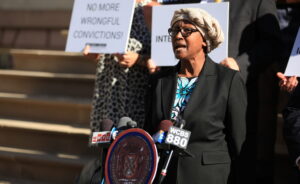
Roe v. Wade Politics
Washington DC – W.A Criswell, President of the First Baptist Church in Dallas, argues that “a child becomes an individual only after birth when it has a life separate from its mother.”
Back in the 70s, the Southern Baptists passed resolutions asking fundamentalists to work towards legalizing abortion in cases of rape, incest, and fetal deformity. These resolutions include scenarios in which there was a possibility of ascertaining evidence of emotional, mental, and physical trauma of the mother.
A decade prior, a cultural rebellion launched between the pastors of the catholic church against the liberal social movements. Phyllis Schlafly once wrote in 1972 that “ Women’s libbers are promoting free sex instead of the slavery of marriage. They are promoting abortions instead of families,” when he opposed the Equal Rights Amendment.
With this began a saga of political drama in the U.S. The republicans witnessed some small wins but mostly disappointments in their fight against abortion. In 1976 at a Republican convention, a constitutional amendment to restore the right to life for unborn children was passed. Meanwhile, twenty-four female delegates signed a minority report urging the party not to take such a stand.
As time passed by, the Republican party became more definite with its rhetoric. They made promises to promote judges at all levels who “respected the sanctity of human life.” But there was deep division within the party. Respecting a women’s body and her choices came into question
Let’s take a look at what was happening on the legislative front. In June 1983, a Senate vote on a constitutional amendment to ban abortion was unsuccessful. Interestingly, 15 democrats voted in favor of this amendment, and 19 Republicans voted against it. This is only two weeks after the Supreme Court reaffirmed the right to an abortion.
Several unsuccessful attempts were made to reverse Roe v. Wade in the ’80s. There were plans to devise coordinated strategies.
Now in the 21’st century when The Supreme Court voted to strike down Roe v. Wade, a leaked draft opinion written by Justice Samuel Alito and circulated by POLITICO placed the nation back on high political flame. Justice Alito is of the opinion that “the issue of abortion should be returned to the people’s elected representatives,” But what about the due process rights of pregnant mothers? Can they be forced to deliver a child and raise the baby against their wishes or abilities?

What Politically Happens Should Roe be overturned?
The immediate impact of this ruling will end half-a century’s constitutional protection of abortion rights. Each state will be allowed to make a decision on banning, restricting, or allowing abortion. There will be no uniformity nationwide.
There is an investigation on this leak and no draft decision has ever been leaked in the history of this court while a case is still pending. The debate on abortion will now be even more intense with this out-of-the-ordinary revelation. No clear information exists on any subsequent changes to this leaked draft. This opinion lets us peek into the Supreme Court justice’s deliberations; experts predict that a conservative majority could possibly cut off abortion rights without completely overturning Roe.
The problem is the lack of clarity about the logic behind rejecting the legal protections guaranteed under Roe, besides the concept of “the right to life” of a fetus inside a pregnant mother’s womb.”
The Republicans justify their stand based on traditional Judaism’s stance on abortion. But while many Jews do not favor the right to abortion, there are a wide number of Jewish religious movements that completely embrace Roe. Republicans believe that there is no written source to prove that Judaism considers “abortion to be a right.” However, Judaism does talk about responsibility along with childbirth and it is the responsibility of both parents under Judaism to be concerned about potential lives. The question here is about the interpretation of the term “responsibility.” Does it mean merely respecting the right to life of a fetus or does it also include being responsible enough to be able to provide for the child and raise them under normal circumstances?
This is about respecting personal freedom v. nascent life and leaving each state to make that decision may end up in chaos. Additionally, the government may not be capable enough to deal with the outrage.
There is no formula so far on how to address conflicting concerns here or weigh one side against the other. The majority of Americans still oppose overturning Roe. We see a lot of political mobilization, protest tactics, the language of the left, and religious interpretations of prenatal life without any academic or logical explanation of why Roe should be overturned. Although many including former Supreme Court Justice, Anthony Scalia opposed Roe, simply overturning the judgment could be against the core values of American jurisprudence.
Women need to be constitutionally protected against harassment and pressure – financial, emotional, and physical. Unfortunately, the anti-abortion movement has become more consolidated over the years. This has turned into some kind of a cultural and religious war as opposed to an evaluation of a human being’s constitutional rights. Currently, 58 percent of Americans support the right to abortion guaranteed under Roe. Between the 70s and now there has been a drastic increase in the number of Democrats who support the right to abortion and only a very small increase in the number of Republicans that support the outlawing of the right to abortion.
The floodgates in the state legislatures have obviously opened up in the last three years. At least nine states passed abortion bans in 2019, hoping their legislation would secure spots in an increasingly conservative supreme court. To re-iterate, Roe protects a women’s right to get an abortion up to a point of viability and not beyond. This is exactly why there is no logic behind state legislatures like that of Mississippi, or courts completely overturning Roe.
Mississippi outlawed abortion for up to 15 weeks. Medically the point of viability is 22-24 weeks. Again there was no legal or medical reasoning behind why that law was passed in the state legislature. Texas solicitor general Jonathan Mitchell did not even wait for the final Supreme Court ruling on overturning Roe and simply advocated a law to allow its resident citizens to vote on this. This comes now as the Southern Baptist Convention has over the years renounced its past views.
So is this now some kind of a religious war? Is this gimmick really working? There is a slogan – “ Love Them Both, a mother and child.” Only time will tell what this means in the world of politics and in the eyes of the US Supreme Court?
Editorial Credits: Adelola Tinubu
Thumbnail Credits: NY Times
Sources
- The Southern Baptist Convention Press Releases.
- Akron v. Akron Center For Reproductive Health.
- The Washington Post
- American Civil Liberties Union of Mississippi.
- Pro-Choice America
- Texas Government Legislations
- Anchorage Daily News




